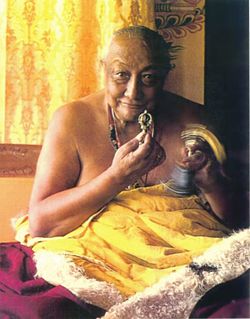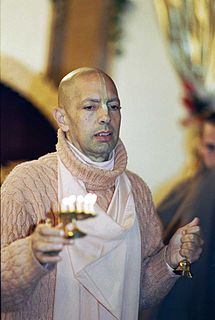A Quote by Radhanath Swami
I traveled around America and then at nineteen, went to Europe and hitchhiked from London to the Himalayas in India. I studied various forms of Christianity, Judaism, Islam, and in India, various forms of Buddhism and Hinduism. Eventually, I came to the path of unconditional love and devotion to the one God, who in our tradition we call Krishna. I met my guru and became a swami. This allowed me to share that gift, which I consider to be a very deep universal expression of compassion.
Quote Topics
Allowed
America
Around
Became
Buddhism
Call
Came
Christianity
Compassion
Conditional Love
Consider
Deep
Devotion
Europe
Eventually
Expression
Forms
Gift
God
Guru
Himalayas
Hinduism
India
Islam
Judaism
Krishna
London
Love
Me
Met
Nineteen
Our
Path
Share
Studied
Then
Tradition
Traveled
Unconditional
Unconditional Love
Universal
Various
Very
Very Deep
Which
Related Quotes
To you, Christianity, Judaism, Islam, Buddhism, and Hinduism look very different, but to me they look the same. Many of you would say that something like Buddhism doesn't even belong on the list, since it doesn't link salvation to divine worship, but to me this is just a quibble. Christianity, Judaism, Islam, Buddhism, and Hinduism all perceive human beings as flawed, wounded creatures in need of salvation, and all rely fundamentally on revelations that spell out how salvation is to be attained, either by departing from this life or rising above it.
I"m often accused of being irreligious, and I suppose it's for this very reason. Whether it's Christianity, Islam, Buddhism, Catholicism, Hinduism, Judaism, or any other ism, when a religioin is created on the subtle premise that God withholds his love and you must submit to the system to earn that love, I consider it the worst of corruptions... For centuries, the church has been telling us that if we want God to love us, we need to follow the rules. It's been far more important to focus on the sin problem than the love problem.
I'd met so many enlightened spiritual teachers that it became a challenge to select one. I believed in the oneness of spirituality - unconditional love for God, and unconditional compassion for the beings of this world - but I also understood that unless I chose a particular path, I couldn't focus and take blessings from teachers that would allow me to have deep realizations and spiritual experiences.
The most important things in life can't be seen with the eyes. Ideas can't be seen. Love can't be seen. Honor can't be seen. This isn't a new concept. Judaism and Christianity and Islam and Buddhism and Taoism have all taught for thousands of years that the highest forms of reality are invisible. God is invisible, and he created the universe. Our souls are invisible, and they give life to our bodies. Angels are invisible, and they're the most powerful of God's creatures.
Devotion is the essence of the path, and if we have in mind nothing but the guru and feel nothing but fervent devotion, whatever occurs is perceived as his blessing. If we simply practice with this constantly present devotion, this is prayer itself. When all thoughts are imbued with devotion to the guru, there is a natural confidence that this will take care of whatever may happen. All forms are the guru, all sounds are prayer, and all gross and subtle thoughts arise as devotion. Everything is spontaneously liberated in the absolute nature, like knots untied in the sky.
The concept (of happiness) is universal. In Buddhism, it is called causeless joy, in Christianity, the kingdom of heaven within, and in Judaism it is called ashrei, an inner sense of holiness and health. Is Islam it is called falah, happiness and well-being, and in Hinduism it is called ananda, or pure bliss.
When we awaken the love for God, that love naturally extends toward every living being. Also, the concept of Krishna and Radha, the masculine and feminine aspect of the one supreme God, was so inclusive that it touched my heart. So when Prabhupada came, I was already following his path. But it was when I saw his compassion, concern and deep wisdom, that I accepted him as my guru and decided to try and assist him. I felt that was where my real home was.



































